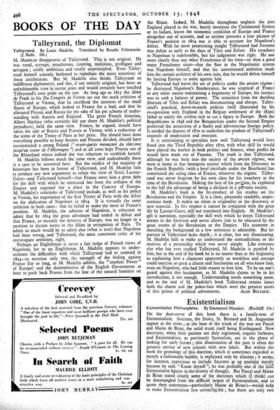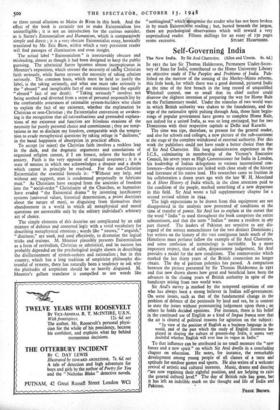Existentialism
Existentialist Philosophies. By Emmanuel Mounier. (Rockliff. 15s.)
ON the dust-cover a this book there is a family-tree of Existentialism. Socrates, the Stoics, St. Bernard and St. Augustine appear as the roots ; at the base of the trunk of the tree are Pascal and Maine de Biran, the solid trunk itself being Kierkegaard. New doctrines, when their patents are duly registered, require forbears, and Existentialists, as previously Surrealists, are in the phase of looking for early heroes ; this illumination of the past is often the greatest service of new schools with new labels. But within the book the genealogy of this doctrine, which is sometimes regarded as merely a fashionable bubble, is explained only by allusion ; it seems, for instance, capricious to include Socrates as an ancestor merely because he said, "Know thyself "; he was probably one of the reagi- Existentialist figures in the history of thought. But Pascal and Maine de Biran stated clearly some of the doctrines which (I think) can be disentangled from the difficult jargon of Existentialism, and to quote their statements—particularly Maine de Biran's—would help to make Existentialism less unintellighle ; but there are only two or three casual allusions to Maine de Biran in this book. And the effect of the book is certainly not to make Existentialism less unintelligible ; it is not an introduction for the curious outsider, as is Sartre's Existentialism and Humanism, which is comparatively simple and direct ; it is a very obscure Existentialist essay, heroically translated by Mr. Eric Blow, within which a very persistent reader will find passages of illumination and even insight.
The actual label " Existentialism " is irretrievably obscure and misleading, almost as though it had been designed to keep the public guessing. The atheistical Sartre becomes almost inconspicuous in Mounier's exposition, which stresses the necessity of taltaig Christian faith seriously, while Sartre stresses the necessity of taking atheism seriously. The common basis, which must be held to justify the label, is the taking seriously, and what one must take seriously is the " absurd " and inexplicable fact of our existence (and the equally " absurd " fact of our death). " Taking seriously " involves not being soothed and diverted from a sense of personal responsibility by the comfortable assurances of rationalist system-builders who claim to explain the fact of my existence, whether the explanation be Christian or non-Christian ; the Existentialist conversion or awaken- ing is the recognition that all rationalisations and pretended explana- tions of my existence and function are frivolous evasions of the necessity for purely personal choice and commitment ; they are temp- tations to me to disclaim my freedom, comparable with the tempta- tion to evade metaphysical questions by taking refuge in " dailiness," in the banal happiness of absorption in practical affairs.
To accept (or reject) the Christian faith involves a reckless leap in the dark, and the dogmatic arguments and consolations of organised religion cannot, if I am honest, relieve the burden of anxiety. Faith is the very opposite of tranquil assurance ; it is a state of tension in which one acknowledges a despair and a doubt which cannot in principle be resolved. For the non-Christian Existentialist the essential formula is : " Without any help, and without any support, man is condemned perpetually to fabricate man." As Christians have escaped from the anxieties of freedom into the " social-order " Christianity of the Churches, so humanists have evaded " the Existential drama " by inventing justificatory systems (universal values, historical determinism, a priori doctrines about the nature of man), so disguising from themselves their abandonment in a world in which all metaphysical and moral questions are answerable only by the solitary individual's arbitrary act of choice.
The simple elements of this doctrine are complicated by an odd mixture of dubious and contorted logic with a vivid vocabulary for describing metaphysical emotions ; words like " nausea," " anguish," " dizziness," are used, and used effectively, to dramatise the logical tricks and truisms. M. Mounier plausibly presents Existentialism as a form of revivalism, Christian or. atheistical, and its success has probably depended on the psychological insight shown in describing the disillusionment of system-seekers and rationalists ; but in this country, which has a long tradition of empiricist philosophy dis- trustful of systems, there has naturally been a tendency to ask why the platitudes of scepticism should be so heavily disguised. M. Mounier's gallant translator is compelled to use words like
" nothingized," which antagonise the reader who has not been broken in by much Existentialist reading ; but, buried beneath the jargon, there are psychological observations which will reward a very unprejudiced reader. Fifteen shillings for an essay of 130 pages



































 Previous page
Previous page